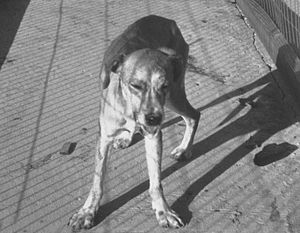സൂനോസിസ്
ഒരു മൃഗത്തിൽ നിന്ന് (സാധാരണയായി കശേരുക്കളിൽ നിന്ന്) മനുഷ്യനിലേക്ക് ചാടിയ ഒരു രോഗകാരി (ബാക്ടീരിയം, വൈറസ്, പരാന്നഭോജികൾ അല്ലെങ്കിൽ പ്രിയോൺ പോലുള്ള പകർച്ചവ്യാധി ഏജന്റ്) മൂലമുണ്ടാകുന്ന ഒരു പകർച്ചവ്യാധിയാണ് സൂനോസിസ് (ബഹുവചനം സൂനോസിസ്, അല്ലെങ്കിൽ സൂനോട്ടിക് രോഗങ്ങൾ).[1][2][3]സാധാരണഗതിയിൽ, രോഗബാധിതനായ ആദ്യത്തെ മനുഷ്യൻ, കുറഞ്ഞത് ഒരു മനുഷ്യനിലേക്കെങ്കിലും പകർച്ചവ്യാധിയെ പകരുന്നു. അത് മറ്റുള്ളവരിലേയ്ക്കും ബാധിക്കുന്നു.
| Zoonosis | |
|---|---|
| മറ്റ് പേരുകൾ | Zoönosis |
 | |
| A dog with rabies. | |
| ഉച്ചാരണം | |
| സ്പെഷ്യാലിറ്റി | Infectious disease |
എബോള വൈറസ് രോഗം, സാൽമൊനെലോസിസ് തുടങ്ങിയ പ്രധാന ആധുനിക രോഗങ്ങളാണ് സൂനോസിസ്. 20-ആം നൂറ്റാണ്ടിന്റെ തുടക്കത്തിൽ മനുഷ്യരിലേക്ക് പകരുന്ന ഒരു സൂനോട്ടിക് രോഗമായിരുന്നു എച്ച്.ഐ.വി. എന്നാൽ ഇപ്പോൾ അത് മനുഷ്യർക്ക് മാത്രമുള്ള ഒരു പ്രത്യേക രോഗമായി മാറിയിരിക്കുന്നു.[4][5][6] പക്ഷിപ്പനിയുടെയും പന്നിപ്പനിയുടെയും പല ഇനങ്ങളും സൂനോസുകളാണെങ്കിലും മനുഷ്യരെ ബാധിക്കുന്ന ഇൻഫ്ലുവൻസയുടെ ഭൂരിഭാഗവും മനുഷ്യരോഗങ്ങളാണ്. ഈ വൈറസുകൾ ഇടയ്ക്കിടെ മനുഷ്യരുടെ ഇൻഫ്ലുവൻസയുമായി കൂടിച്ചേരുകയും 1918-ലെ സ്പാനിഷ് ഫ്ലൂ അല്ലെങ്കിൽ 2009-ലെ പന്നിപ്പനി പോലുള്ള പാൻഡെമിക്കുകൾക്ക് കാരണമാവുകയും ചെയ്തു.[7] പ്രാദേശിക പ്രദേശങ്ങളിൽ പൊതുജനാരോഗ്യവും വെറ്റിനറി ആശങ്കയുമുള്ള അവഗണിക്കപ്പെട്ട ഉഷ്ണമേഖലാ രോഗങ്ങളിൽ ഒന്നാണ് ടെനിയ സോളിയം അണുബാധ.[8] ഉയർന്നുവരുന്ന വൈറസുകൾ, ബാക്ടീരിയകൾ, ഫംഗസുകൾ, പരാന്നഭോജികൾ എന്നിങ്ങനെയുള്ള രോഗാണുക്കളുടെ ഒരു ശ്രേണിയാണ് സൂനോസുകൾക്ക് കാരണമാകുന്നത്. മനുഷ്യരെ ബാധിക്കുന്ന 1,415 രോഗാണുക്കളിൽ 61% മൃഗരോഗികളായിരുന്നു.[9] മിക്ക മനുഷ്യരോഗങ്ങളും മൃഗങ്ങളിൽ നിന്നാണ് ഉത്ഭവിച്ചത്. എന്നിരുന്നാലും, മനുഷ്യരിൽ നിന്ന് മനുഷ്യരിലേക്ക് പകരുന്ന പേവിഷബാധ പോലുള്ള രോഗങ്ങളെ മാത്രമേ നേരിട്ടുള്ള സൂനോസുകളായി കണക്കാക്കൂ.[10]
സൂനോസുകൾക്ക് വ്യത്യസ്ത പ്രക്ഷേപണ രീതികളുണ്ട്. നേരിട്ടുള്ള സൂനോസിസിൽ, വായു (ഇൻഫ്ലുവൻസ) അല്ലെങ്കിൽ കടി, ഉമിനീർ (റേബിസ്) എന്നിവ വഴി മൃഗങ്ങളിൽ നിന്ന് മനുഷ്യരിലേക്ക് നേരിട്ട് രോഗം പകരുന്നു.[11]നേരെമറിച്ച്, രോഗം വരാതെ രോഗകാരിയെ വഹിക്കുന്ന ഒരു ഇടത്തരം സ്പീഷീസ് (വെക്റ്റർ എന്ന് വിളിക്കുന്നു) വഴിയും സംക്രമണം സംഭവിക്കാം. മനുഷ്യരിൽ നിന്ന് മൃഗങ്ങളെ ബാധിക്കുമ്പോൾ, അതിനെ റിവേഴ്സ് സൂനോസിസ് അല്ലെങ്കിൽ ആന്ത്രോപോനോസിസ് എന്ന് വിളിക്കുന്നു.[12] ഈ പദം ഗ്രീക്കിൽ നിന്നുള്ളതാണ്: ζῷον zoon "Animal", νόσος nosos "sickness".
ഏത് മൃഗ വൈറസുകൾക്കാണ് മനുഷ്യശരീരത്തിൽ സ്വയം പകർത്താൻ കഴിയുമെന്ന് നിർണ്ണയിക്കുന്നതിൽ ഹോസ്റ്റ് ജനിതകശാസ്ത്രം ഒരു പ്രധാന പങ്ക് വഹിക്കുന്നു. മനുഷ്യ കോശങ്ങളിൽ സ്വയം പകർത്താൻ തുടങ്ങുന്നതിന് കുറച്ച് മ്യൂട്ടേഷനുകൾ ആവശ്യമുള്ള മൃഗ വൈറസുകളാണ് അപകടകാരികൾ. ഈ വൈറസുകൾ അപകടകരമാണ് കാരണം മ്യൂട്ടേഷനുകളുടെ ആവശ്യമായ സംയോജനങ്ങൾ സ്വാഭാവിക ശേഖരണിയിൽ ക്രമരഹിതമായി ഉണ്ടാകാം.[13]
കാരണങ്ങൾ
തിരുത്തുകമൃഗങ്ങളെ വളർത്തുന്നതിൽ നിന്നാണ് മൃഗരോഗങ്ങളുടെ ആവിർഭാവം ഉണ്ടായത്.[14] മൃഗങ്ങൾ, മൃഗ ഉൽപന്നങ്ങൾ, അല്ലെങ്കിൽ മൃഗങ്ങളുടെ ഡെറിവേറ്റീവുകൾ എന്നിവയുമായി സമ്പർക്കം പുലർത്തുന്നതോ ഉപഭോഗം ചെയ്യുന്നതോ ആയ ഏത് സാഹചര്യത്തിലും Zoonotic ട്രാൻസ്മിഷൻ സംഭവിക്കാം. ഇത് ഒരു സഹജീവി (വളർത്തുമൃഗങ്ങൾ), സാമ്പത്തിക (കൃഷി, വ്യാപാരം, കശാപ്പ് മുതലായവ), ഇരപിടിച്ചുതിന്നുന്ന (വേട്ടയാടൽ, കശാപ്പ് അല്ലെങ്കിൽ കാട്ടുമൃഗങ്ങളുടെ ഉപഭോഗം) അല്ലെങ്കിൽ ഗവേഷണ സന്ദർഭത്തിൽ സംഭവിക്കാം.
അവലംബം
തിരുത്തുക- ↑ 1.0 1.1 "Zoonosis". Merriam-Webster Dictionary. Retrieved 29 March 2019.
- ↑ WHO. "Zoonoses". Archived from the original on 3 January 2015. Retrieved 18 December 2014.
- ↑ "A glimpse into Canada's highest containment laboratory for animal health: The National Centre for Foreign Animal Diseases". science.gc.ca. Government of Canada. 22 October 2018. Archived from the original on 20 June 2019. Retrieved 16 August 2019.
Zoonoses are infectious diseases which jump from an animal host or reservoir into humans.
- ↑ Sharp PM, Hahn BH (September 2011). "Origins of HIV and the AIDS pandemic". Cold Spring Harbor Perspectives in Medicine. 1 (1): a006841. doi:10.1101/cshperspect.a006841. PMC 3234451. PMID 22229120.
- ↑ Faria NR, Rambaut A, Suchard MA, Baele G, Bedford T, Ward MJ, et al. (October 2014). "HIV epidemiology. The early spread and epidemic ignition of HIV-1 in human populations". Science. 346 (6205): 56–61. Bibcode:2014Sci...346...56F. doi:10.1126/science.1256739. PMC 4254776. PMID 25278604.
- ↑ Marx PA, Alcabes PG, Drucker E (June 2001). "Serial human passage of simian immunodeficiency virus by unsterile injections and the emergence of epidemic human immunodeficiency virus in Africa". Philosophical Transactions of the Royal Society of London. Series B, Biological Sciences. 356 (1410): 911–920. doi:10.1098/rstb.2001.0867. PMC 1088484. PMID 11405938.
- ↑ Scotch M, Brownstein JS, Vegso S, Galusha D, Rabinowitz P (September 2011). "Human vs. animal outbreaks of the 2009 swine-origin H1N1 influenza A epidemic". EcoHealth. 8 (3): 376–380. doi:10.1007/s10393-011-0706-x. PMC 3246131. PMID 21912985.
- ↑ Coral-Almeida M, Gabriël S, Abatih EN, Praet N, Benitez W, Dorny P (6 July 2015). "Taenia solium Human Cysticercosis: A Systematic Review of Sero-epidemiological Data from Endemic Zones around the World". PLOS Neglected Tropical Diseases. 9 (7): e0003919. doi:10.1371/journal.pntd.0003919. PMC 4493064. PMID 26147942.
{{cite journal}}: CS1 maint: unflagged free DOI (link) - ↑ Taylor LH, Latham SM, Woolhouse ME (July 2001). "Risk factors for human disease emergence". Philosophical Transactions of the Royal Society of London. Series B, Biological Sciences. 356 (1411): 983–989. doi:10.1098/rstb.2001.0888. PMC 1088493. PMID 11516376.
- ↑ Marx PA, Apetrei C, Drucker E (October 2004). "AIDS as a zoonosis? Confusion over the origin of the virus and the origin of the epidemics". Journal of Medical Primatology. 33 (5–6): 220–226. doi:10.1111/j.1600-0684.2004.00078.x. PMID 15525322.
- ↑ "Zoonosis". Medical Dictionary. Archived from the original on 28 June 2013. Retrieved 30 January 2013.
- ↑ Messenger AM, Barnes AN, Gray GC (2014). "Reverse zoonotic disease transmission (zooanthroponosis): a systematic review of seldom-documented human biological threats to animals". PLOS ONE. 9 (2): e89055. Bibcode:2014PLoSO...989055M. doi:10.1371/journal.pone.0089055. PMC 3938448. PMID 24586500.
- ↑ Warren CJ, Sawyer SL (April 2019). "How host genetics dictates successful viral zoonosis". PLOS Biology. 17 (4): e3000217. doi:10.1371/journal.pbio.3000217. PMC 6474636. PMID 31002666.
{{cite journal}}: CS1 maint: unflagged free DOI (link) - ↑ Nibert D (2013). Animal Oppression and Human Violence: Domesecration, Capitalism, and Global Conflict. Columbia University Press. p. 5. ISBN 978-0231151894.
ഗ്രന്ഥസൂചിക
തിരുത്തുക- Bardosh K (2016). One Health: Science, Politics and Zoonotic Disease in Africa. London: Routledge. ISBN 978-1-138-96148-7..
- Crawford D (2018). Deadly Companions: How Microbes Shaped our History. Oxford University Press. ISBN 978-0198815440.
- Felbab-Brown V (October 6, 2020). "Preventing the next zoonotic pandemic". Brookings Institution. Archived from the original on 21 January 2021. Retrieved 19 January 2021.
- Greger M (2007). "The human/animal interface: emergence and resurgence of zoonotic infectious diseases". Critical Reviews in Microbiology. 33 (4): 243–299. doi:10.1080/10408410701647594. PMID 18033595. S2CID 8940310. Archived from the original on 1 August 2020. Retrieved 29 September 2020.
- H. Krauss, A. Weber, M. Appel, B. Enders, A. v. Graevenitz, H. D. Isenberg, H. G. Schiefer, W. Slenczka, H. Zahner: Zoonoses. Infectious Diseases Transmissible from Animals to Humans. 3rd Edition, 456 pages. ASM Press. American Society for Microbiology, Washington, D.C., 2003. ISBN 1-55581-236-8.
- González JG (2010). Infection Risk and Limitation of Fundamental Rights by Animal-To-Human Transplantations. EU, Spanish and German Law with Special Consideration of English Law (in ജർമ്മൻ). Hamburg: Verlag Dr. Kovac. ISBN 978-3-8300-4712-4.
- Quammen D (2013). Spillover: Animal Infections and the Next Human Pandemic. ISBN 978-0-393-34661-9.
പുറംകണ്ണികൾ
തിരുത്തുക| Classification |
|---|